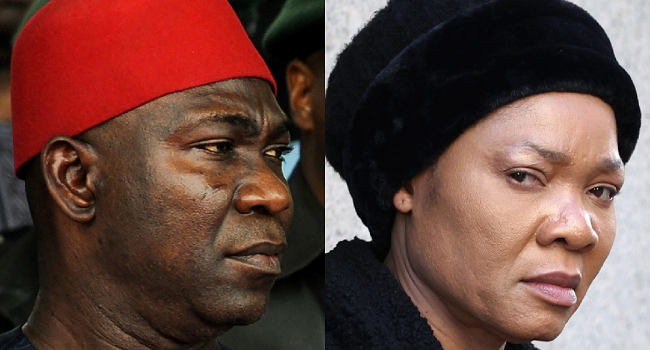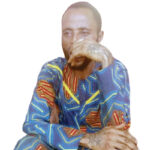
A former three-term Deputy President of the Senate, Ike Ekweremadu, 60, was on Friday jailed in the United Kingdom for nine years and eight months for an organ trafficking plot.
His wife, Beatrice, 56, was also jailed for four years and six months due to her “more limited involvement” in the plot, as the court described Ekweremadu as the “driving force throughout” the process.
A medical doctor, Obinna Obeta, 56, also bagged 10 years after the judge found that he had “targeted the potential donor, who was young, poor and vulnerable”.
Meanwhile, the apex Igbo socio-cultural organisation, Ohanaeze Ndigbo, has berated the Federal Government for not helping the embattled senator.
The prosecutor, Hugh Davies KC, said the three defendants were guilty of trafficking with ‘the highest level of culpability’.
Saturday PUNCH reported how Ekweremadu, who served as the Deputy Speaker and Speaker of the Economic Community of West African State Parliament, was arrested on June 23, 2022, by the London Metropolitan Police for reportedly ‘conspiring to bring a child to the UK for organ harvesting’.
The police said investigation into the matter was launched after detectives were alerted to ‘potential offenses under the modern slavery legislation in May 2022’. It said the child had been safeguarded and it was working closely with partners on continued support.
His case was scheduled for further hearing on July 7, 2022, after which he was said to have been found guilty of the allegations and remanded in prison, awaiting sentencing.
Deputy Chief Crown Prosecutor and National Modern Slavery Lead at the Crown Prosecution Service, Lynette Woodrow, said it had been “our first conviction for trafficking for the purposes of organ removal in England and Wales”.
“With all trafficking offenses, the consent of the person trafficked is no defense. The law is clear; you cannot consent to your own exploitation,” Woodrow said.
The court said the doctor lied to doctors and falsely claimed the young potential donor was a cousin of the senator’s daughter, Sonia, who urgently needed a transplant.
The judge said the three left the potential donor facing a “substantial and long-term impact on his daily life”.
“People trafficking across international borders for the harvesting of human organs is a form of slavery,” the judge added.
In a victim’s personal statement, the 21-year-old Nigerian market trader, who was not named, told the court he used to pray every day to be given the opportunity to come to the UK to work or study.
He said to make it happen, he agreed to medical tests in Lagos and meetings with doctors in London, believing that they were required for his UK visa during the Covid-19 pandemic.
The 21-year-old said he only realised what was planned when he met doctors at the Royal Free Hospital in London who began discussing a kidney transplant.
He told the court he would not have agreed to it, adding that his body was ‘not for sale’.
The victim is now being helped by a charity in the UK, according to his lawyer in Nigeria.
In his statement, he said he couldn’t think of going back to Nigeria because the people for which he was being prosecuted were powerful people and that he was worried for his safety.
He refused to apply for financial compensation from the Ekweremadu family, telling a detective he did not need anything from them.
Obasanjo, others’ intervention
During the court proceedings, former President Olusegun Obasanjo wrote to the UK court, begging for leniency.
Also, the House of Representatives appealed to the court to “temper justice with mercy”, while urging the Federal Government to take diplomatic steps to intervene in his trial. It cited “the predicaments of Ekweremadu’s ailing daughter, who needs financial support and parental love of her parents to scale through her dire health challenge, noting that the Ekweremadus must have learnt their lessons.”
Similarly, the Economic Community of West African States Parliament, where Ekweremadu once served, in a letter by the Speaker of the ECOWAS parliament, Dr Sidie Mohamed Tunis, appealed for leniency, saying it believed lessons had been learnt by everybody.
FG did nothing – Ohanaeze
Reacting to the UK court’s judgment, the spokesperson for Ohanaeze Ndigbo, Chief Alex Ogbonnia, said the Federal Government did nothing to help Ekweremadu.
In an interview with one of our correspondents, he stated, “They did not treat him like someone who has served meritoriously in this country. Rather, while he was facing the travails, the Federal Government came out with charges and allegations of corruption and seized his properties.
“This is a man who has been around you, walked with you for years and when he needed your help, there were busy talking about auctioning his properties. All those things indicated that it was not only the UK court that was after him, but the FG was also after him.”
Describing the judgment as ‘shocking’ and ‘painful’, the spokesman said Igbo leaders would pay Ekweremadu a visit soon, adding that the former lawmaker would come out of the experience ‘stronger and better’.
He added, “Before now, although not as Ohanaeze, we have visited him in prison. We still intend to do so even as he begins his sentence. It is shocking and painful that an illustrious Igbo man of that calibre will be involved in this kind of sentencing. However, there is nothing we can do about it for now.
“But I believe Ekweremadu will come out stronger and better. He has always been a strong and courageous man. Ohanaeze prays he comes out healthy to face the world again.”
Reps advise Ekweremadu
The House of Representatives has urged a former Deputy President of the Senate, Ike Ekweremadu, to appeal the sentencing.
Reacting to the judgment on Friday, the Chairman of the House Committee on Media and Public Affairs, Benjamin Kalu, urged Ekweremadu to file an appeal, describing the sentencing as “sad and unfortunate.”
Kalu said, “He should exercise his right of appeal and appeal against the judgment. He has always been a man of dignity. What happened was unfortunate in his effort to be a great father to his sick child.
“I am not sure he hid his intentions for medical tourism to the UK to help his child. What I equally wonder is why the British Embassy failed to deny him a travel visa, knowing that the expressed intention was against their law. The investment of the institution in this man is huge and Nigeria will miss his contributions to the parliament.”
The Chairman of the Senate Committee on Media and Public Affairs, Senator Ajibola Basiru, could not be reached on the telephone and he had yet to reply to a message from our correspondent as of press time.
SANs react
A Senior Advocate of Nigeria, Chief Mike Ozekhome, speaking on suggestions on whether an arrangement could be made with the UK for the senator to serve his sentence in Nigeria, stated, “In terms of exchange of ideas and programmes, arresting a person who is trying to escape justice from one place to another and the like; there is mutual legal assistance in that regard to going through the extradition process or proceedings.
“Besides, each country is independent in its judicial and legal system. For a Nigerian jailed in the UK, for instance, Nigeria cannot interfere. This is the same case even if a British citizen is jailed in Nigeria. The UK cannot interfere nor can Nigeria be forced to release such a person or commute the terms of imprisonment.
“All that can be done is what I have seen going on, with the appeals by the National Assembly, ECOWAS Parliament, former President Olusegun Obasanjo and other great Nigerians.”
Another senior lawyer, Mr Yusuf Ali (SAN), said Nigerians should borrow a leaf from the UK justice system.
He said, “The lesson for all of us is that we must also make our judicial system work. That starts from the point of investigation. Ekeremadu’s matter is a classical case of a working justice system. Before he was even taken to court, proper investigation had already been done.
“In Nigeria, people will first be taken to court before they will start looking for evidence. We should not put the cart before the horse.”











